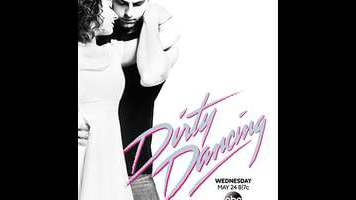That’s a lot of background for a TV movie, one that most viewers have probably already made up their minds about—you either want to have the time of your life, or you don’t. (It’s safe to say you won’t.) But while six years isn’t an especially long gestation period for any theatrical production, all that development history finds its way on screen during this unwieldy three-hour adaptation. Although Ortega was replaced by Wayne Blair, the meta framework he utilized for the Rocky Horror remake remains in place, as does the High School Musical movies’ message-driven aesthetic. But Blair and screenwriter Jessica Sharzer have also put their own stamp on the film, tacking on a midlife crisis story to telegraph what had been so poignantly and briefly touched on in the original. It’s not clear just whose idea it was to educate rather than entertain, but that’s exactly what Dirty Dancing labors to do. It’s no longer a tale of a young woman’s sexual awakening, one that so deftly wove in its feminism the first time around. It’s now an ersatz course on those topics, complete with supplementary readings on racism.
Abigail Breslin, late of Scream Queens, plays our new Baby Houseman, a young woman about to enter college and adulthood. The film takes place over her last summer before attending Mount Holyoke, where she plans to study economics so she can do something about global poverty. Her goals remain as endearing and improbable as they were when Grey was in the role, and to her credit, Breslin does her best to rise above scenes that involve packing mostly books for a summer in the Catskills to broadcast her intelligence. But Breslin has to stand for more than Grey ever did; she’s now the smart girl, the feminist, the sexual being. Her interactions with the snobby vacationers are turned into mini-lectures, which Breslin delivers as dutifully as a TA.
And yet, for all the socially conscious significance the filmmakers try to imbue her with, her progressive ideals are undercut by the surrounding male characters. In both these iterations, Baby is pro-choice; she never balks at the idea of helping Penny (Nicole Scherzinger) get the money for an abortion. But it’s her father, Dr. Jake Houseman (Bruce Greenwood), who gives a speech about not being judgmental, although he remains pissed at Johnny Castle (Colt Prattes), whom he thinks is responsible for getting her pregnant. Just as baffling, but far more insulting is the moment in which Baby, who’s otherwise struggling to reconcile female desire with her smart girl-ness, needs a man to help her understand The Feminine Mystique.
This exchange is just one of several desperate attempts to update the larger story, so it doesn’t feel so tied to 1960s morality. But when everyone is kind of feminist, including Baby’s mother (Debra Messing), who won’t settle for a fraction of her husband’s attention anymore, it makes Baby’s increasingly less subtle activism far less revolutionary. It also leaves us without any real tension, aside from having Billy Dee Williams stand in the way of interracial lovers played by Sarah Hyland and J. Quinton Johnson.
Getting the sociopolitical context so wrong might approach being forgivable if the central romance between Baby and Johnny weren’t also botched. Breslin and Prattes go through the motions together, but without generating any heat. It’s not just that Breslin and Prattes lack chemistry; they appear downright uncomfortable around each other. And they’re supposed to be playing two people who find a way to be together despite strict class conventions. Despite his obvious knack for dance, Prattes’ virtually nonexistent acting experience sinks any chance at a believable love story. But rather than admit defeat, Blair and Sharzer keep the spotlight on Prattes’ stilted acting via a ridiculous coda. Even after doing their best to turn one of the most romantic movies of the ’80s into a dull after-school special, it seems they hadn’t learned their lesson.


 Keep scrolling for more great stories from A.V. Club.
Keep scrolling for more great stories from A.V. Club.